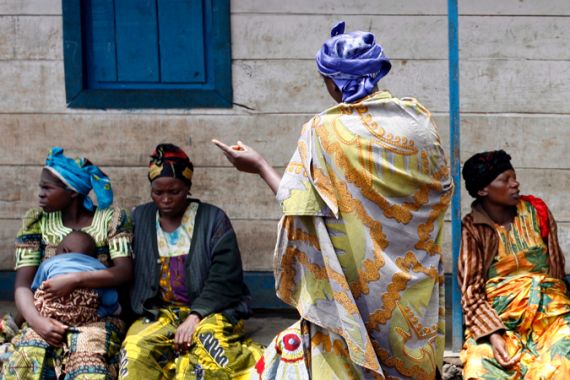Wanted DR Congo general faces new charges
Rights group says Bosco Ntaganda, sought by ICC for war crimes, has forcibly recruited 149 boys since April.

A Congolese general being sought for use of child soldiers in a past conflict has forcibly recruited another 149 boys and teenagers since April, according to Human Rights Watch.
The New York-based rights group said on Thursday its investigation had found that the children and teens were abducted by Bosco Ntaganda’s rebel army from their homes, their schools, from fields and the sides of roads in eastern Congo.
In a report published on Wednesday, Human Rights Watch said that the children were beaten if they resisted, complained or walked too slowly.
It said several of the boys complained that once they joined the ranks, they were forced to walk in front so that they would be the first to be ambushed or shot at.
Ntaganda, once a feared regional commander, joined the Congolese army in 2009 after a peace deal that paved the way for him and his men to be integrated into the military.
Abduction of children
Although the Hague-based ICC had indicted him for war crimes allegedly committed by troops under his command in 2003, including abducting children to serve as fighters, Ntaganda was allowed to live freely in the provincial capital of Goma.
But last month the agreement between him and the Congolese government disintegrated, and he and his troops defected.
Ntaganda is believed to be the force behind a new rebel group which is now fighting the Congolese government in the district of Masisi in Congo’s wild east, a zone of thick jungle cut by skinny trails.
Human Rights Watch estimates that between 300 and 600 soldiers followed Ntaganda in his mutiny.
A government spokesman said he was not surprised by the findings of Human Rights Watch.
“We are aware of Ntaganda’s efforts to recruit not only children but also adults into his movement against our country, and it’s why we are hunting him down. So we’ve learned nothing new from the HRW report,” Lambert Mende told the Associated Press news agency on Wednesday.
Anneke Van Woudenberg, a senior researcher with Human Rights Watch, said that despite the warrant, the Congolese government decided to promote Ntaganda and made him a general.
“He became increasingly powerful. In fact, he became one of the most powerful generals in eastern Congo. He was the deputy commander of military operations; walked and lived openly in Goma, going to top restaurants,” she told Al Jazeera from London.
“Up until last month, when he mutinied, he – in fact – was not hard to find and walked openly in Goma because he was a general and the Congolese army was not trying to arrest him.”
Calls for arrest
Woudenberg said there was speculation Ntaganda mutinied because of increasing calls from the international community for his arrest.
According to interviews conducted by Human Rights Watch with witnesses, Ntaganda and fighters under his command told those living in towns under their control that they needed children to replenish their ranks.
One woman from the locality of Birambizo said that Ntaganda came to her village and said: “Since [villagers] have been with the government, you’ve gotten nothing. Why not join me?”
The woman said: “[Ntaganda] asked us to give our children, our students, to him to fight. He came to our village himself, like [detained rebel leader Laurent] Nkunda used to do. But we refused and said our children should go to school.”
Soon after, the fighters returned to take the children by force. Some were hastily given military training, but the majority were used to porter weapons and supplies to front-line positions, said the report.